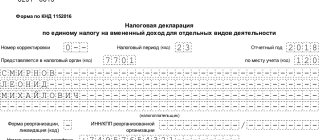What VAT rate to use for international transportation by Russian organizations
A zero VAT rate for international transport is provided for a number of services (the full list is in paragraph 1 of Article 164 of the Tax Code of the Russian Federation), including:
- services for the international transportation of goods by various transport, in which the destination or departure point is located outside the Russian Federation;
- transport and forwarding services provided by Russian organizations and individual entrepreneurs on the basis of a transport expedition agreement. Their classification is in the National Standard GOST R 52298-2004, approved. by order of Rostekhregulirovaniya dated December 30, 2004 No. 148-st.
If the service is not included in the list of clause 1 of Art. 164 of the Tax Code of the Russian Federation, then it is taxed at the full rate.
Important! If you want to apply a 0% rate, indicate the correct subject of the contract: freight forwarding services or international transportation services.
Features of taxation of international cargo transportation
O. Sumina, lawyer
International transport is a troublesome business. Delivery of goods from the seller to the buyer is an independent business. It attracts close attention from tax authorities. In order not to give them unnecessary grounds for tax claims, all sharp corners must be smoothed out at the stage of preparing the draft agreement.
Attached file (6 Kb)
The degree of transport burden imposed on each of the parties to the purchase and sale agreement depends on the point at which the risk of loss of the goods passes from the seller to the buyer. The transition can occur at the seller’s warehouse, at the time of transfer of the goods to the carrier, after delivery of the goods to the place of unloading, or in the territory of the buyer’s country*. This determines the choice of delivery option.
Shipping
If the contract provides for “pickup” from the seller’s warehouse, then his costs are minimal. Almost any company can pack and load goods on its own. But when transportation involves many stages, it is difficult to do it on your own. Maintaining a powerful transport service for international flights is not always economically justified. It is quite natural that the lion's share of delivery work is entrusted to specialized companies.
In some cases, it may be sufficient to conclude a contract of carriage. Under this agreement, the transport company undertakes to deliver the cargo entrusted to it to its destination and deliver it to the recipient, and the sender must pay for delivery (Article 785 of the Civil Code of the Russian Federation).
Conditions of transportation on the territory of Russia are regulated by industry regulations. “The rules and general requirements for servicing shippers and consignees...” establish the procedure for rail transportation (directive of the Ministry of Railways of the Russian Federation dated December 6, 1995 No. S-932). In road transport, the “General Rules for the Transportation of Goods...”, approved by the Ministry of Automobile Transport of the RSFSR on July 30, 1971, and the Charter of Road Transport, adopted by Resolution of the Council of Ministers of the RSFSR No. 12 of January 8, 1969, apply. In the air, the “Rules of International Air Transportation...” are applied. approved by the USSR MGA on January 3, 1986 No. 1/I. In maritime shipping, the norms of the “Code of Merchant Shipping of the Russian Federation” dated April 30, 1999 No. 81-FZ apply.
The sender is obliged to draw up documents accompanying the transfer of cargo at all stages of transportation. The form, number of copies, and procedure for filling out transportation documents are determined by industry codes, charters, and rules. These documents, among other things, serve to recognize the concluded agreement as a contract of carriage. They confirm the validity of expenses, as required by paragraph 1 of Article 252 of the Tax Code of the Russian Federation. Without them, the contract may be qualified differently. In this case, the contractor will not be able to reduce the taxable base for income tax for expenses associated with the provision of transport services (letter of the Department of Tax Administration for Moscow dated July 7, 2003 No. 26-12/37027). The contract of carriage may be re-qualified for another reason: in connection with the expansion of the list of services that the carrier undertakes to provide.
Transport expedition as a mediation agreement
The length of the routes and the crossing of state borders force the party responsible for the delivery of goods to carry out a number of additional operations in addition to transportation. The following become mandatory: completion of customs formalities, payment of duties, fees, verification of the quantity and condition of cargo, its loading, unloading, storage and receipt at the destination. The provision of such services is regulated by the transport expedition agreement. Under this agreement, the forwarder undertakes, for a fee and at the expense of the other party (the client - the shipper or consignee), to perform services related to the transportation of goods (clause 1 of Article 801 of the Civil Code of the Russian Federation).
The forwarder can fulfill its obligations independently, and if the terms of the contract allow it, then it can involve third parties for this (Article 805 of the Civil Code of the Russian Federation). This right of the forwarder serves as the basis for tax inspectors to see signs of intermediary activity in the transport expedition. Neither civil nor tax legislation contains a clear provision on the presence of elements of mediation in the execution of a transport expedition agreement. But, judging by official explanations, taxation schemes should be applied to it, as under a commission agreement and similar ones (letter of the Moscow Department of Taxation and Tax Administration dated November 20, 2002 No. 24-11/56384).
The consequences of this approach are especially noticeable when calculating value added tax. A company that acts for a fee in the interests of another person must transfer VAT on the entire amount of remuneration (Article 156 of the Tax Code of the Russian Federation). In this case, she does not have the right to apply tax deductions. After all, all expenses for the execution of the order are reimbursed by the customer, which means that it is he who will be charged the input VAT for deduction.
For VAT purposes, a transport company can also become an “intermediary”. When a carrier forwards cargo, the narrow scope of the contract of carriage does not correspond to its content. Such a complex agreement is subject to the rules of transport expedition (clause 2 of Article 801 of the Civil Code of the Russian Federation).
At the same time, the Resolution of the Presidium of the Supreme Arbitration Court of the Russian Federation dated January 26, 1999 No. 5056/98 states that the activities of the contractor under a transport expedition agreement do not always relate to intermediary activities.
The controversial situation can be somewhat clarified by referring to the All-Russian Classifier of Types of Economic Activities, Products and Services OK 004-93 (approved by Resolution of the State Standard of the Russian Federation dated August 6, 1993 No. 17). It contains an open list of forwarding services, but only some of them are directly characterized as intermediary: “... intermediary operations with freight, intermediary operations with customs clearance of goods, intermediary operations for the freight of cargo space on a ship or on an airplane...” (subgroup 633 of section I of part III OKDP). It is obvious that not all components of the freight forwarder’s range of services have signs of mediation. Arbitrators also pay attention to this (resolution of the Federal Antimonopoly Service of the North Caucasus District dated July 6, 2001 in case No. F08-2023/2001-628A).
The risk of tax disputes can be reduced when preparing a draft agreement and at the time of drawing up the contractor’s report. His responsibilities need to be described in detail and clearly formulated exactly how all services will be organized: independently or by other companies, and accurately indicate the amount of remuneration. Then, when the money arrives, it will not be difficult to distribute the total amount in accordance with the terms of the agreement. And for each part, apply the appropriate taxation procedure. For example, specifically stipulate the obligation of the contractor to conclude an agreement with the carrier. And immediately indicate the commission for this service. The second point is to instruct the forwarder to package and pack the cargo, indicating the cost of this work. This cost may include the cost of purchasing packaging materials, labor and associated insurance premiums, facility rental and/or depreciation. A separate line must indicate the amount of money transferred to pay customs duties and fees. And in the same order, draw up a report on the execution of the order, highlighting the amount of remuneration, the cost of services provided on your own, reimbursable expenses, with supporting documents attached.
The taxation scheme depends not only on the option of qualifying the contract. In order to pay taxes (for example, VAT), you need to decide on the place of sale of services. And during international transport it becomes “elusive”.
VAT. Place of sale of services
The object of taxation for value added tax is the sale of goods (work, services) on the territory of the Russian Federation (subclause 1, clause 1, article 146 of the Tax Code of the Russian Federation). The place of implementation of works and services should be determined in accordance with Article 148 of the Tax Code of the Russian Federation. Before January 1, 2006, the determination procedure was different for different types of transport. The amended version of the article establishes uniform rules for carriers on all types of transport. The place of sale will be considered the territory of the Russian Federation if two conditions are simultaneously met:
- the carrier** is a Russian organization or individual entrepreneur;
- one or both (initial and final) points of transportation are located on the territory of Russia (subclause 4.1, clause 1, article 148).
Under these conditions, the range of options when Russia is recognized as a place of sale of services is limited (see table in the attached file).
This scheme does not apply to services for the transportation of goods placed under the international customs transit regime. For such services, the location of the carrier’s activities matters. If this place is recognized as the territory of Russia, then it will also be considered a place for the sale of services for the transportation of goods placed under the international customs transit regime (subclause 4.2, clause 1, article 148 of the Tax Code of the Russian Federation).
The following documents can confirm the place of performance of work (provision of services):
- a contract concluded with foreign or Russian persons;
- acts (reports, etc.) of acceptance of work performed (clause 4 of article 148 of the Tax Code of the Russian Federation).
Those who are forced to apply the provisions of Article 148 of the Tax Code must keep in mind that its current version is the result of several stages of lawmaking.
Changing and supplementing the text from time to time, legislators ultimately proposed a contradictory option, combining both permissive innovations (subclause 4.1, clause 1, article 148 of the Tax Code of the Russian Federation) and restrictive norms of previous years (clause 2, article 148 of the Tax Code of the Russian Federation). If a foreign organization acts as a carrier, then the newly introduced subclause (subclause 4.1 clause 1 of Article 148 of the Tax Code of the Russian Federation) in any case does not recognize Russian territory as the place of provision of services. And paragraph 2 of Article 148 of the Tax Code of the Russian Federation obliges the place of sale of services of a foreign transport organization to recognize Russia if at least one of the destination or departure points is located on its territory. In our opinion, in a dispute on this topic it is necessary to appeal not to the letter, but to the spirit of the law, because the newly introduced subclause 4.1 of clause 1 corresponds to the general logic of Article 148, and the contradictory norm of clause 2 destroys it. Having understood the object of taxation, you should decide on the tax rate.
For whom is VAT 0 percent?
A 0 percent rate is established for the sale of goods for export and goods placed under the free customs zone regime (subclause 1, clause 1, article 164 of the Tax Code of the Russian Federation). For works and services directly related to their production and sale, a 0 percent rate is also applied (subclause 2, clause 1, article 164 of the Tax Code of the Russian Federation). Such services include organization and support of transportation, transportation or transport, organization, support, loading and transhipment. In some cases, tax authorities try to refuse VAT refunds to freight forwarders. They believe that such organizations do not have the right to apply a tax rate of 0 percent and forwarding services are subject to taxation on a general basis.
However, the arbitrators side with taxpayers and recognize that forwarding activities are directly related to the sale of goods (for example, decisions of the Federal Antimonopoly Service of the Moscow District dated April 8, 2004 in case No. KA-A40/2447-04, Northwestern District dated March 18, 2003 . in case No. A56-20966/02).
The listed services are taxed at a rate of 0 percent even when they are related to the import of goods. And also in relation to goods placed under the processing regime in the customs territory (subparagraph 2, paragraph 1, article 164 of the Tax Code of the Russian Federation). A 0 percent rate is also applied for work and services for the transportation and transport of goods placed under the customs regime of international customs transit (subclause 3, clause 1, article 164 of the Tax Code of the Russian Federation).
When establishing the tax rate for VAT, the Tax Code makes a separate point for international transportation by rail. From May 1, 2006, they are taxed at a zero rate if they are related to the export or export of processed products in the customs territory of the Russian Federation (subclause 9, clause 1, article 164 of the Tax Code of the Russian Federation). The 0 percent rate does not apply to rail transportation of imports.
Zero VAT enhances the attractiveness of international freight forwarding activities. However, it is often difficult to justify a zero rate. Even for those who make every effort, success cannot be guaranteed.
Advantage or Punishment
In cases specifically stipulated by Article 164 of the Tax Code, the contractor is obliged to apply a rate of 0 percent (letter of the Federal Tax Service of Russia dated January 13, 2006 No. MM-6-03 / [email protected] ). But for this you need to submit a number of documents to the tax office:
- contract (or a copy thereof) for the provision of services;
- a bank statement about the actual receipt of revenue from the buyer for these services;
- a customs declaration (or a copy thereof) only when moving goods by pipeline or along power lines or in the case of an international customs transit tax;
- copies of shipping documents confirming crossing the customs border of Russia (clause 4 of article 165 of the Tax Code of the Russian Federation).
Some reduction in the list of required documents (compared to 2005) is more than compensated by the fact that the submission procedure remains the same.
Those organizations that are not required to present customs documents must submit the rest of the package along with the tax return (clause 10 of Article 165 of the Tax Code of the Russian Federation). But it is not always possible to fulfill the obligations of the parties under international contracts within one tax period. And by the time the declaration is submitted, some documents (for example, bank account statements about the receipt of revenue) simply do not exist in nature. This means that it is not possible to confirm the validity of the 0 percent rate. Therefore, a rate of 18 percent will need to be applied. In this case, the customer (buyer) does not have the right to deduct input VAT calculated at an inflated rate. In short, the performer can only pay the 18 percent tax from his own funds. And later, when all the documents are ready, you will need to present them along with your tax return to get a refund of previously paid amounts. The tax inspectorate has the right to review and verify the received papers within three months, and if it considers the justifications insufficient, then refuse to refund the tax (clause 4 of article 176 of the Tax Code of the Russian Federation). * Options for distributing responsibility for the goods between the seller and the buyer are considered by the official rules of the International Chamber of Commerce Incoterms 2000. The interpretation of trade terms is given in our directory on page 92. ** In this case, it does not matter whether the carrier uses its own transport or charters aircraft, sea vessels, or inland navigation vessels. VAT on ship lessor services is not considered in this article. For such services, the place of sale is determined according to the rules of paragraph 2 of Article 148 of the Tax Code of the Russian Federation.
attention
Ruslan Ukrainsky, lawyer:“Mediation from a legal point of view is the performance of legally significant actions, the execution of transactions in the interests of another person. It is better to clearly indicate in the transport expedition agreement that in this case the forwarder acts as a commission agent or attorney. This will bring clarity to tax issues. True, provided that the amount of remuneration under the contract includes the part that is due for performing the functions of a commission agent or attorney.”
Hello Guest! Offer from "Clerk"
Online professional retraining “Chief accountant on the simplified tax system” with a diploma for 250 academic hours . Learn everything new to avoid mistakes. Online training for 2 months, the stream starts on March 1.
Sign up
What documents need to be submitted to confirm the zero VAT rate for international transport?
To confirm the validity of applying a zero VAT rate for such services, the following documents will need to be submitted to the Federal Tax Service along with the declaration:
- a contract (copy of a contract) of a taxpayer with a foreign or Russian person for the provision of specified services;
- copies of transport, shipping and (or) other documents confirming the export of goods outside the territory of the Russian Federation (import of goods into the territory of the Russian Federation).
There are situations when cargo is transported by several modes of transport. For example, goods are transported across Russia by rail, and then another carrier delivers the goods by sea to a destination in a foreign country. Whether it is possible to apply a zero VAT rate in such a situation is explained by the Russian Ministry of Finance in its letter dated 02.08.11 No. 03-07-15/72. According to officials, only the second carrier has the right to a zero VAT rate in relation to services provided in the area from the point of transhipment of goods to the final destination.
For the complete procedure for confirming VAT, see the article “Terms for VAT refund under the general procedure.”
Results
International transportation is regulated by international conventions and local documents of the country of departure. The document regulating the 0% VAT rate is the Tax Code of the Russian Federation. To confirm it, two types of documents are needed - a contract with the correct subject of activity and copies of documents confirming the export of goods. The destination of the goods must be located outside the territory of the Russian Federation. There are explanations from the Ministry of Finance and judicial practice for various types of emergency situations.
Firmmaker, July 2017 (we monitor the relevance) Anna Sheshenina (Luksha) When using the material, a link to the article is required



